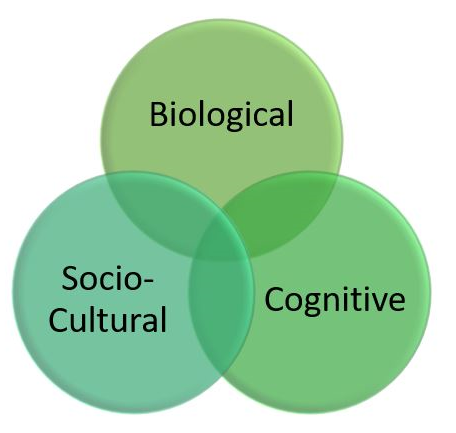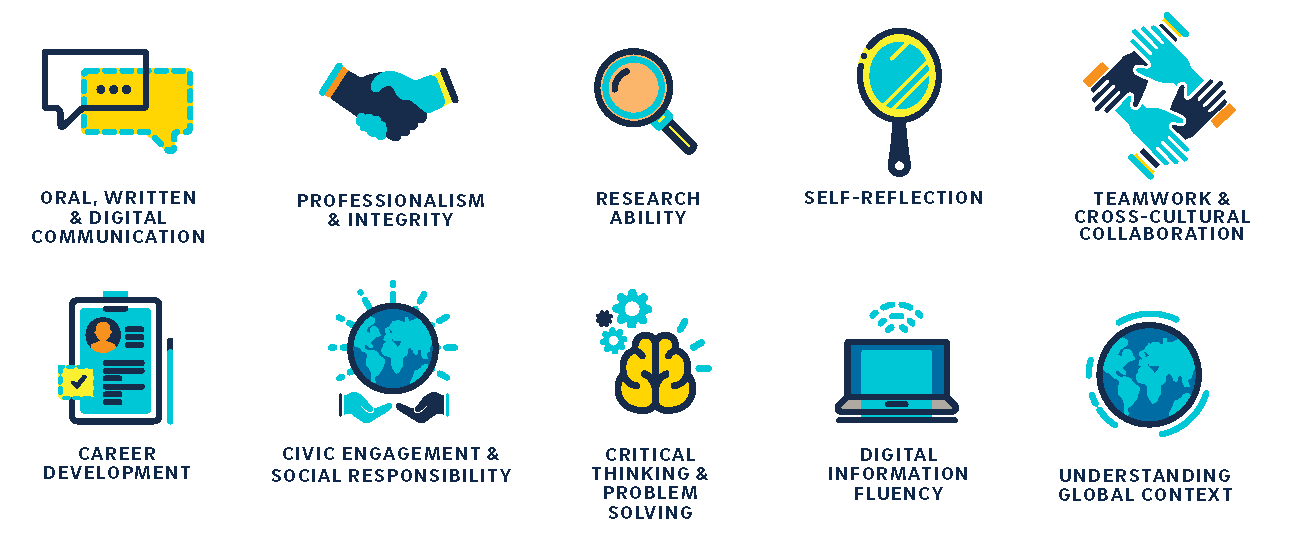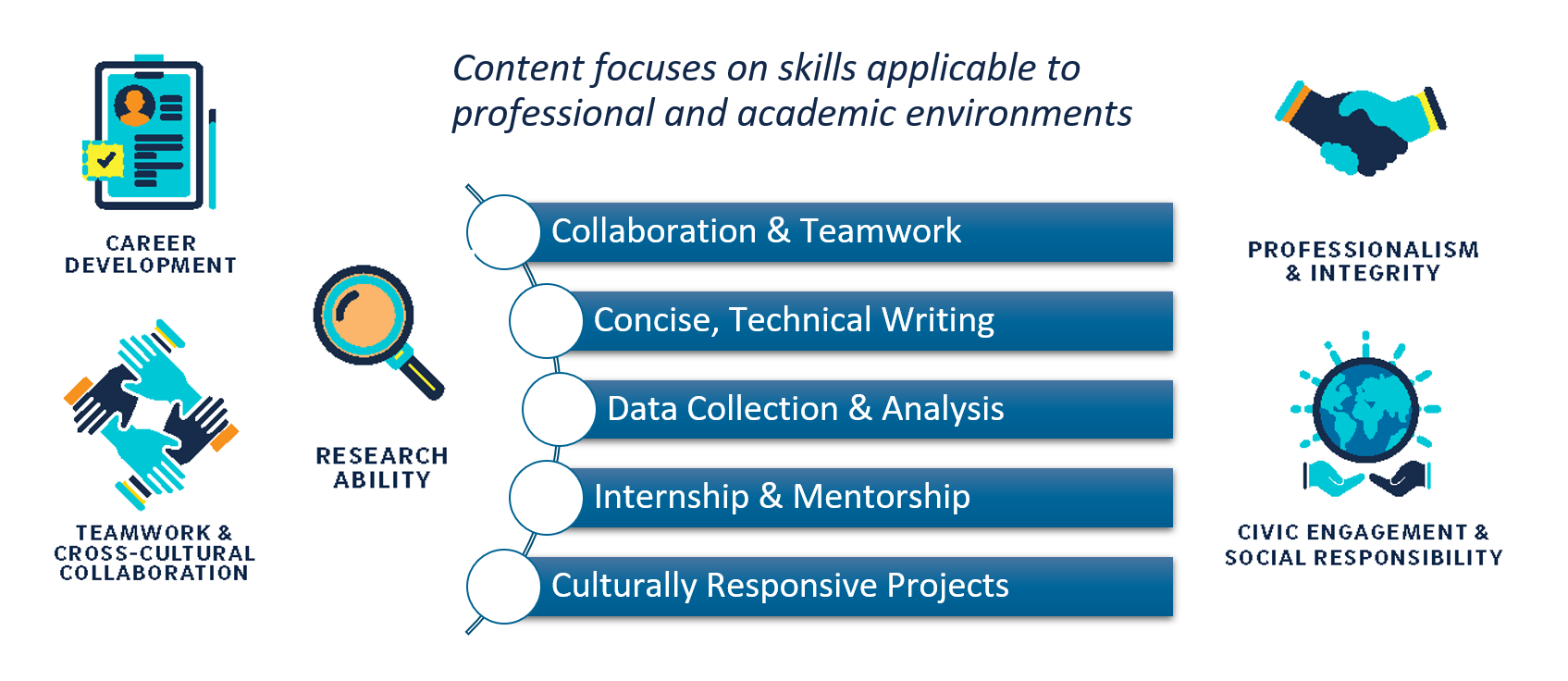Human Developmental Sciences
Curriculum Overview
The HDS curriculum focuses on growth and changes in biology, behavior, and environment that occur over the human lifespan, what causes them, and their impacts. Courses can cover the entire lifespan, or examine a life-stage.


HDS does this though the integration of our three domains:
- Biological: the physical maturation and aging of the human body
- Cognitive: everything to do with the mind
- Socio-Cultural: the environments of development, such as family, school, peers, and society
Professional Development
The HDS major curriculum also aligns with the following UCSD Career Readiness Compentencies 
The HDS Major
All HDS majors include coursework in the following areas:
Major Preparation
The lower divsion coursework of the major is considered "major preparation". It provides foundational concepts in Biology, Social Science, Developmental theory, and quantative reasoning.
UCSD Career Compentencies Introduced: Critical Thinking & Problem Solving ~ Digital Information Fluency ~ Oral, Written, & Digital Communication ~ Research Ability
Core Theory
 |
HDS Core: Breadth in Development |  |
The HDS core series includes coursework focused in each or our 3 domains, looking at typically developing populations across the lifespan.
- Breadth within the 3 Domains
- Spectrum of behavioral traits
- Lifespan
- Typically developing populations
UCSD Career Compentencies Reinforced: Critical Thinking & Problem Solving ~ Digital Information Fluency ~ Oral, Written, & Digital Communication ~ Research Ability
Developmental Specializations
 |
In-depth topics in Development |  |
The HDS Specialization Series gives students the opportunity to delve deeper into topics in Development relevant to their interests and career goals. Courses can be focused on a single issue in development, or multiple, and have a wide variety of formats and disciplines.
- Depth within the 3 Domains
- Multiple or single behavioral trait
- Lifespan or Life-stage
- Typically developing or Special Populations
Research & Practica

Coursework includes
- Quantitative (Experimental) Projects
- Qualitative (Internship) Studies
- Field, Lab, & Special Projects
New UCSD Career Compentencies Introduced : Civic Engagement & Social Responsibility ~ Leadership ~ Professionalism & Integrity ~ Teamwork & Cross-Cultural Collaboration
UCSD Career Compentencies Reinforced & Demonstrated: Critical Thinking & Problem Solving ~ Digital Information Fluency ~ Oral, Written, & Digital Communication ~ Research Ability ~ Career Development
Capstone Seminar
 |
Integrative Seminar in Development |  |
The HDS Senior Capstone, taught in the format of a graduate seminar, is an intergrative special topics capstone that allows students to examine a special topic in development, integrating all knowledge and skills gained from the HDS curriculum.
UCSD Career Compentencies Demonstrated: Critical Thinking & Problem Solving ~ Digital Information Fluency ~ Oral, Written, & Digital Communication ~ Research Ability ~ Career Development ~ Civic Engagement & Social Responsibility ~ Leadership ~ Professionalism & Integrity ~ Teamwork & Cross-Cultural Collaboration
Degrees Offered
The Human Developmental Sciences major offers the option of completing either a Bachelor of Arts or a Bachelor of Science (with or without a specialization).- Human Developmental Sciences Bachelor of Arts
- Human Developmental Sciences Bachelor of Science
- Human Developmental Sciences Bachelor of Science with a Specialization in Equity and Diversity
- Human Developmental Sciences Bachelor of Science with a Specialization in Healthy Aging
Any of the above degrees, combined with career specific preparation, are perfectly acceptable for pursuing career and graduate school opportunities.
Differences in a Bachelor of Arts vs. Bachelor of Science
Academically, a Bachelor of Arts degree and a Bachelor of Science degree are equally valued. Both offer the students who earn them the opportunity to continue their education at the graduate degree level, and most academic or professional tracks will not require one degree over the other -- it is far more important that you focus on the specific classes you need for your future academic preparation (including specific graduate school prerequisites), and choose the program which has the right fit for you. Typically, Bachelor of Arts degrees in any discipline allow students to sharpen their communication and writing skills. By comparison, a Bachelor of Science degree typically fosters analytical skills and can incorporate a specialization within the subject matter. All of the courses listed within the B.S. for Human Developmental Sciences -- such as the methods elective -- can be taken for B.A. elective credit, so the BS degree is not required to take advantage of advanced research opportunities.
Please note that all classes taken for an HDS major or minor must be taken for letter grades.
HDS Bachelor of Arts (B.A.)
The HDS Bachelor of Arts (B.A.) degree provides broad-based preparation for many fields with solid grounding in both theory and methodology in the discipline of human development, while providing a great deal of curricular flexibility for specific career goals.
- Lower-Division Requirements (B.A.): 28 units / 7 Courses
- Upper-Division Requirements (B.A.): 52 units / 12 courses
HDS Bachelor of Science (B.S.)
The HDS Bachelor of Science (B.S.) degree is designed for those considering advanced graduate level study or other professional engagement in the health sciences, therapy, rehabilitation, education, or research. The BS requires additional coursework, and includes at least one term of calculus.
- Lower-Division Requirements (B.S.): 32 units / 8 courses
- Upper-Division Requirements (B.S.): 56 units / 13 Courses
The HDS Minor
A total of 7 courses (1 lower-division, 6 upper-division) are required to complete a minor in Human Developmental Sciences.
HDS Specializations
See all HDS specializations below
Specialization in Equity and Diversity
Specializations in Equity and Diversity
The HDS Equity and Diversity Specialization addresses the need for more in-depth and comprehensive coursework covering issues of “Diversity, Equity, and Inclusion.” This curricular track bridges theory and practice, and provides a forum for the discussion of diversity-related topics and ideas in relation to human development. As an interdisciplinary undergraduate program, HDS feels it is critical for equity and inclusion issues to be uniquely understood from a developmental perspective, in which the needs of all groups are considered from an intersectional lens (i.e. race, ethnicity, gender, sexual orientation, social class, dis/ability, age) in relation to growth and change across the lifespan. Additionally, given the increasing focus on engaging in culturally sustaining practices across professional fields, this specialization seeks to better prepare students to engage with these pressing social issues when they leave the University.
Bachelor of Science (B.S.) in Human Developmental Sciences with a specialization in Equity and Diversity
The B.S. specialization in Equity and Diversity degree provides coursework designed for those considering advanced graduate level study or other professional engagement in the health sciences, therapy, rehabilitation, or research and who wish to broaden their understanding of diverse perspectives.
The specialization mirrors the traditional B.S., with 3 of the 13 upper division courses focused specifically on issues of Equity and Diversity, related to Development.
- Lower-Division Requirements (B.S.): 32 units / 8 courses
- Upper-Division Requirements (B.S.): 56 units / 13 Courses
Minor in Human Developmental Sciences with a specialization in Equity and Diversity
The Minor specialization in Equity and Diversity includes core coursework selected from broad-based developmental science classes, as well as specific coursework in Equity and Diversity, including one practicum. The selection of Equity and Diversity coursework for this minor is similar to the concentration in the major specialization.
- Lower-Division Requirements: 1 course
- Upper-Division Requirements: 6 Courses
Specialization in Healthy Aging
Specializations in Healthy Aging
Bachelor of Science (B.S.) in Human Developmental Sciences with a specialization in Healthy Aging
The B.S. specialization in Healthy Aging degree is intended to equip students with the knowledge to work specifically with the aging population in medicine, research, industry, with families, and within our communities.
The specialization mirrors the traditional B.S., with 3 of the 13 upper division courses focused specifically on issues related to Aging.
- Lower-Division Requirements (B.S.): 32 units / 8 courses
- Upper-Division Requirements (B.S.): 56 units / 13 Courses
Minor in Human Developmental Sciences with a specialization in Equity and Diversity
The HDS Minor in Healthy Aging includes core coursework selected from broad-based developmental science classes, as well as specific coursework in Healthy Aging, including one practicum. The selection of Healthy Aging coursework for this minor is similar to the concentration in the major Specialization. A total of 7 courses (1 lower-division, 6 upper-division) are required to complete a Human Developmental Sciences Minor in Healthy Aging. Courses are listed below.
- Lower-Division Requirements: 1 course
- Upper-Division Requirements: 6 Courses